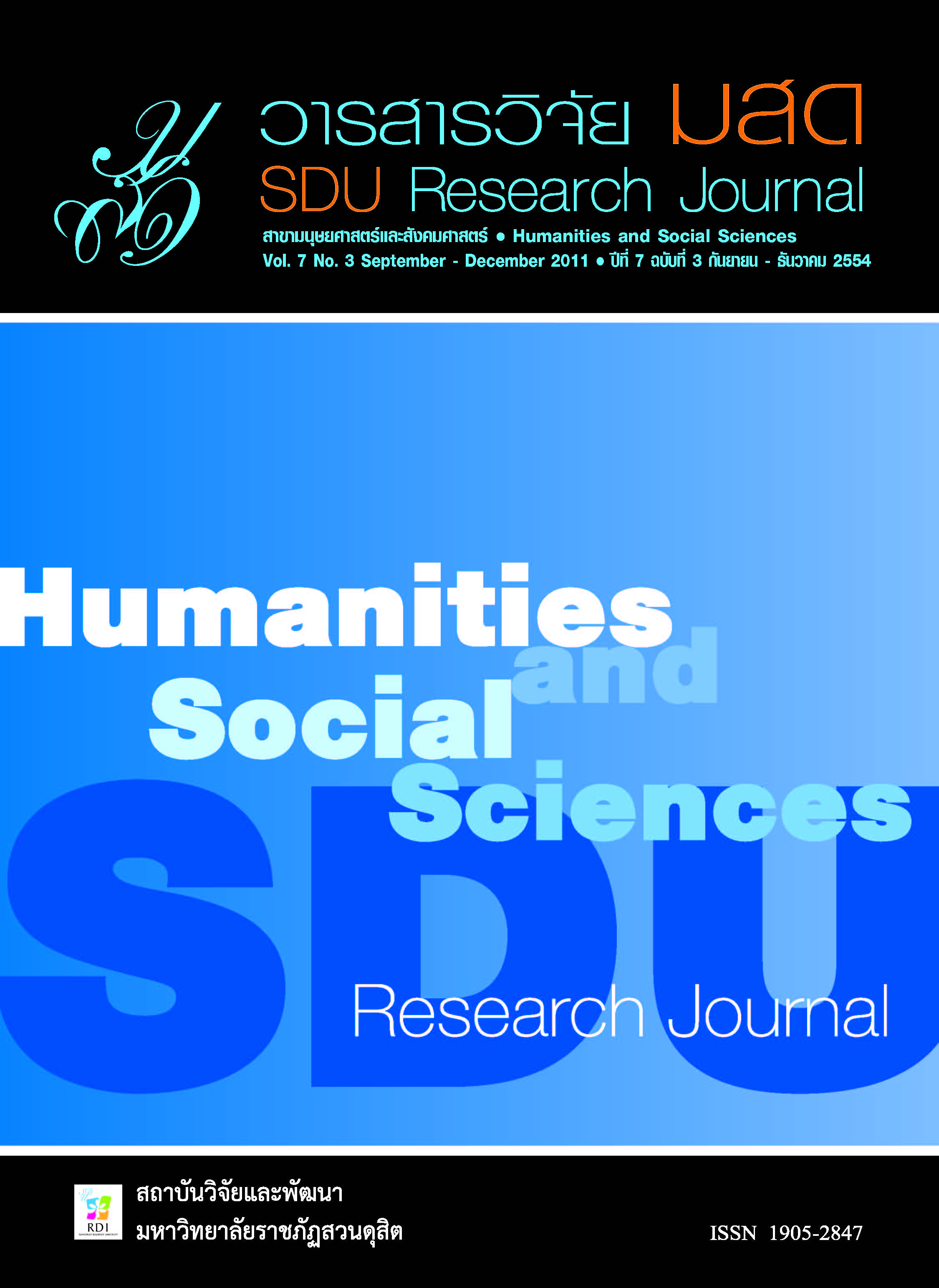การพัฒนาคุณภาพชีวิตอย่างยั่งยืนตามหลักธรรมทิฏฐธัมมิกัตถประโยชน์ 4: กรณีศึกษา อำเภอม่วงสามสิบ จังหวัดอุบลราชธานี
Keywords:
ทิฏฐธัมมิกัตถประโยชน์ 4, การพัฒนาคุณภาพชีวิตอย่างยั่งยืน, Dhiddhadhammikatthaprayote 4, Sustainable quality of life developmentAbstract
บทคัดย่อ
จุดมุ่งหมายของการวิจัยนี้เพื่อ 1) พัฒนารูปแบบการพัฒนาคุณภาพชีวิตอย่างยั่งยืนตามหลักธรรมทิฏฐธัมมิกัตถประโยชน์ 4 2) ศึกษาภูมิหลังของชุมชนกลุ่มตัวอย่าง และ 3) ศึกษาผลกระทบในการนำรูปแบบการพัฒนาคุณภาพชีวิตอย่างยั่งยืนตามหลักธรรมทิฏฐธัมมิกัตถประโยชน์ 4 ไปใช้ ประชาชนกลุ่มตัวอย่างประกอบด้วยประชาชนจำนวน 342 คน จากชุมชน 3 หมู่บ้าน ได้แก่ หมู่บ้านดอนแดงใหญ่ หมู่บ้านหนองไข่นก และหมู่บ้านดอนแดงน้อย อำเภอม่วงสามสิบ จังหวัดอุบลราชธานี ขั้นตอนดำเนินการวิจัยประกอบด้วย 4 ขั้นตอน คือ 1) สำรวจข้อมูลเบื้องต้นของชุมชน 2) รวบรวมข้อมูลพื้นฐานของชุมชนเพื่อพัฒนารูปแบบการพัฒนาคุณภาพชีวิต 3) แนะนำรูปแบบการพัฒนาคุณภาพชีวิต และ 4) ศึกษาผลกระทบจากการนำรูปแบบการพัฒนาคุณภาพชีวิตไปใช้ จากผลการวิจัยนี้ได้รูปแบบการพัฒนาคุณภาพชีวิตอย่างยั่งยืนตามหลักธรรมทิฏฐธัมมิกัตถประโยชน์ 4 โดยการนำหลักธรรมและทฤษฏีเศรษฐกิจพอเพียงมาบูรณาการเข้าด้วยกัน รูปแบบนี้ประกอบด้วยหลักสูตร และกิจกรรมพัฒนาชุมชนเข้มแข็ง 7 ด้าน คือ 1) ด้านความรู้ 2) ด้านที่พักอาศัยถูกสุขลักษณะอนามัยที่ดี 3) ด้านส่งเสริมความดี 4) ด้านการพัฒนาแบบผสมผสานบ้าน วัด โรงเรียน (บวร) 5) ด้านศีลธรรม คุณธรรม 6) ด้านประเพณีและวัฒนธรรม และ 7) ด้านการสื่อสารข้อมูล ผลการวิจัยพบว่า กลุ่มตัวอย่างมีความขยันมาก แต่ไม่สามารถรักษาทรัพย์และใช้จ่ายอย่างเหมาะสม ประชาชนร้อยละ 49.70 มีรายได้ไม่พอกับรายจ่ายและต้องกู้เงิน ประชาชนไม่นิยมจดบันทึกรายรับรายจ่าย หลังจากการนำรูปแบบการพัฒนาคุณภาพชีวิตไปใช้ ประชาชนมีหลักธรรม 4 ด้านเพิ่มขึ้น คือ ขยันหา รักษาทรัพย์ คบคนดีเป็นมิตร และใช้ชีวิตอย่างพอเพียง
คำสำคัญ : ทิฏฐธัมมิกัตถประโยชน์ 4, การพัฒนาคุณภาพชีวิตอย่างยั่งยืน
ABSTRACT
The purposes of this study were 1) to develop the pattern for sustainable life development through Dhamma Dhiddhadhammikatthaprayote 4 2) to study general communities’ background of samples and 3) to explore the impacts of implementing the pattern for sustainable quality of life development through Dhamma Dhiddhadhammikatthaprayote 4. The samples of this study were 342 villagers from three villages; Barn Don Daeng Yai, Barn Nong Khai Nok, and Barn Don Daeng Noi. This study employed four procedures: 1) survey basic information of the communities, 2) collect basic information of the communities for developing the model for sustainable quality of life development through Dhamma Dhiddhadhammikatthaprayote 4, 3) study the impacts of implementing the model for sustainable quality of life development through Dhamma Dhiddhadhammikatthaprayote 4, and 4) study the impacts of the implementation of the model. From this study the model for sustainable quality of life development through Dhamma Dhiddhadhammikatthaprayote 4 was created by integrating Dhamma and Sufficiency Economy theory. This model consisted of the curriculum for sustainable quality of life development and activities to strengthen the communities in 7 areas; 1) knowledge, 2) healthy residences, 3) goodness promotion, 4) integrative development of community temples and schools, 5) morality and ethics, 6) customs and cultures, and 7) communication. The results showed that people were very diligent, however, they could not save nor spend money properly. The villagers, 49.70% did not have enough income and they had to loan. They did not like to note their incomes and expenses. After the implementation of the model for sustainable quality of life development, villagers were better in being diligent, saving money, having good friends, and having sufficient ways of life.
Keyword : Dhiddhadhammikatthaprayote 4, Sustainable quality of life development








